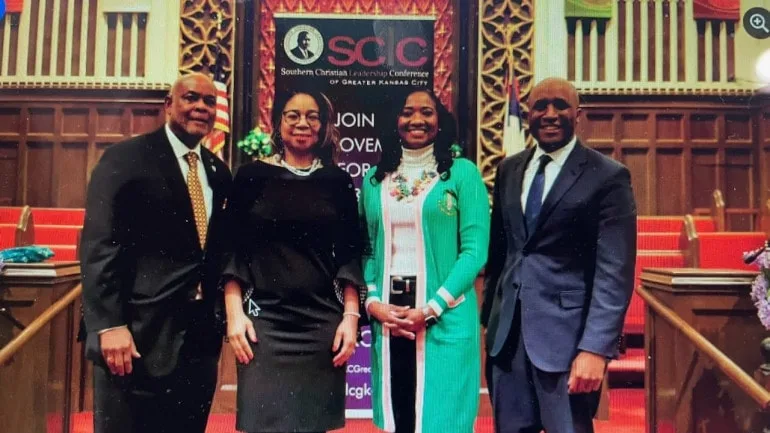The Kansas City Mayor’s Commission on Reparations will have more time to complete its historic work and city funds to help offset research and other costs.
The question of whether city funding would be provided has shadowed the commission since the City Council approved its creation in January 2023.
Answers are beginning to take shape.
Mayor Quinton Lucas has committed to proposing that the city approve $210,000 of the $510,000 requested by the reparations commission within the next 30 days, said Chair Terri E. Barnes, during the commission’s monthly meeting on Tuesday.
Approval of the city funds would need council approval. The plan is to ask the civic and business community for the remaining funds.
“One of the requests that he (Lucas) made is that we use those funds to identify that lead investigator and those researchers so that we can get out of the gate and begin to do some of the research work,” Barnes said of Lucas.

Recent discussions with the mayor also offered some grace from initial expectations.
Commissioners were sworn in May of 2023. They had been tasked to produce an initial report within their first year, and a final report within 18 months. More feasible deadlines are to be decided later.
“I am really encouraged and excited that it finally feels like we’ve gotten to first base,” said Barnes, who is also president of The Nia Project. “Very shortly we will be able to kind of step out with good messaging and good support to begin to do the work that the commission was stood up to do.”
The current 12-member commission is tasked with a Herculean project — tracing past, current and future impacts of racism on Black citizens. The commission also is to document harms that the city could be held accountable for and might agree to help repair, ensuring that such damages are not repeated.
A 13th member is expected to be appointed by Lucas soon, someone to represent criminal justice. One of the initial members stepped down last fall.
Barnes acknowledged one of the most common assumptions surrounding reparations is that it must include financial compensation for those deemed to be eligible.
But repair can take many forms, she said.
“We always hear about the cash payments,” Barnes said. “But repair can be a variety of different things including changes in policies and procedures. It could be land. It could be monuments. It could be street signs. It could be all kinds of things.”
Local advocates of the reparations movement always intended to seek city funding to do the work.
They wanted researchers to be hired as experts to study topics such as health, homeownership, criminal justice and educational outcomes, and how they intersect.
Commissioners realized early on that they would need to educate people on what reparations might entail, offering chances for community feedback through listening sessions and town halls.
“I am really encouraged and excited that it finally feels like we’ve gotten to first base. Very shortly we will be able to kind of step out with good messaging and good support to begin to do the work that the commission was stood up to do.”
Terri E. Barnes, chair of the Kansas City Mayor’s Commission on Reparations
Some commissioners felt that the city should fund the entire project.
“I was really troubled by the fact that they’re going to go to the corporate community for this funding for something that the city should fund,” said Fritz Riesmeyer, a partner with Seigfreid Bingham.
Danise Hartsfield, executive director of Communities Creating Opportunities, raised the prospect of non-city funding arriving with strings attached. An example would be if a funder was also possibly complicit in some of the harms outlined in a finding. Would there be a hesitancy in what was revealed?
Others saw value in drawing support from the local civic community and philanthropic foundations.
For instance, foundations like Health Forward already have a focus on addressing health inequities in the Black community, said Cornell Ellis, an educator and founder of Brothers Liberating Our Communities .
Uncovering harms and documenting how systemic racism works is just one part of the commission’s charge.
“That’s the point of our work, right?” Ellis asked.
It allows the opportunity for entities to reconcile or at least recognize harms that they had a part of in the past, an acknowledgment that the negative effects still currently exist, he said.
Reparations can be controversial, especially in the current political environment with a lot of negative discussion around measures that can be labeled as diversity or, more sarcastically, as “woke.”
Several members of the commission had the opportunity to attend the National Symposium for State and Local Reparations. Some of the information shared was from the National Black Cultural Information Trust , presentations that discussed the deep work necessary to explain and answer questions about reparations.
Such work is necessary to gain the ability to discuss the issue with people who might contend that their families never owned slaves, or people who assume that reparation is an unearned grab for extraordinary amounts of money.
Collecting family stories is one way to help guide conversations, the commissioners said.
One of the more difficult concepts to explain is how past actions, such as redlining, segregated schools and other now-illegal actions, continue to affect Black communities.
Each of the commission’s different study areas will be the topic of listening sessions, some with guest speakers.
The commission is also planning a series of concerts this year, especially to engage the Black community and answer questions. Concerts feature old-school music, hip-hop, gospel and jazz/blues.
Other upcoming events are being organized by a separate group, the KC Reparations Coalition. Its work grew out of early organizing on the issue by the National Black United Front-Kansas City.
The Buy Black Expo will be held on Feb. 10 at the Bruce R. Watkins Cultural Center. Two showings of the PBS documentary “ The Big Payback” are planned, followed by discussions.
‘The Big Payback’
The film follows the story of Robin Rue Simmons, who helped lead Evanston, Illinois, to become the first city in the nation to pass tax-funded reparations.
Simmons will also be a virtual guest via Zoom at the coalition’s next meeting at 6 p.m. on Jan. 29.
The next meeting of the full mayor’s commission is Feb. 27, as they are held on the fourth Tuesday of each month.
Last week, during a Martin Luther King Jr. celebration, Mayor Lucas verbally committed to the city providing at least part of the reparations commission funding, said the Rev. Vernon Howard Jr., president of the Southern Christian Leadership Conference of Greater Kansas City.
In fact, gaining Lucas’ commitment and educating more people on the necessity for reparations was a goal of this year’s celebration, Howard said.
Three other City Council members were also at the Martin Luther King Jr. Mass Celebration and at least verbally offered their support for city funding. They included Mayor Pro-Tem Ryana Parks-Shaw, Melissa Patterson-Hazley and Darrell Curls.
Council member Melissa Robinson is also considered a supporter of the group’s goals and will hold meetings to help discuss needs with area businesses and nonprofits.
Mary Sanchez is senior reporter for Kansas City PBS.


